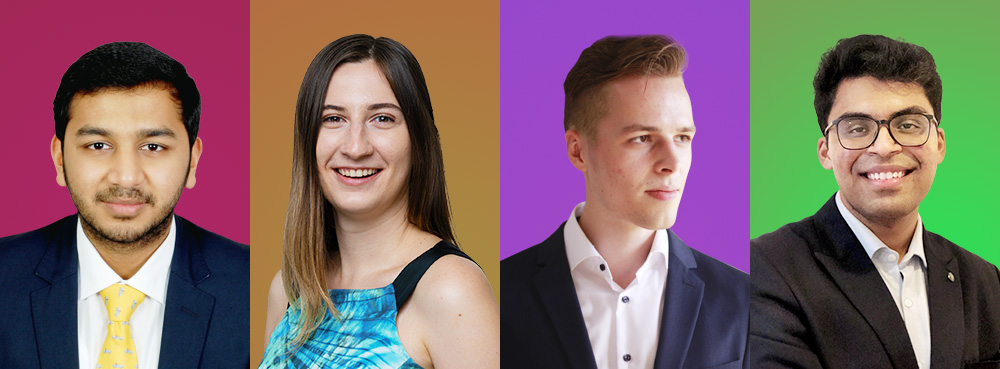It was a double win for NUS Business School at the DB Schenker Southeast Asia Cluster “2020 Re-imagine the Future” business challenge. The first prize was a tie that was awarded to two teams, both of which included students from our school.
Team Agile consisted of undergraduates Josh Ng Zhi Hui and Zhang Quyi from NUS Business and Russell Chin and Puah Huei Shuen from NUS Engineering. The other top team, Team Interworld, consisted of MSc in Management students — Bryan Bews, Vashisth Dalmia, Andra Siderache and Nehal Taparia.
In a Facebook post announcing the winners, DB Schenker’s SEA Cluster CEO Robert Reiter said: “The objective of the business challenge is to involve students from top universities in the region to solve logistics challenges in Southeast Asia. It was a tight race between the finalists. Besides out-of-the-box thinking, we judged the teams on the executability of their proposals. The presentations of the winning teams were excellent and they backed their proposals with powerful market research.”
Both Josh and Quyi specialise in Operations and Supply Chain Management. Their team advocated for DB Shenker to revamp existing operations using new technology and in new sustainable areas. Next, they recommend the company to expand into SEA by tapping on current growth trends such as warehousing and relocation services. Thirdly, DB Shenker can venture into new opportunities such as joining an additive manufacturing regional hubs network.

Meet the winning undergraduate team. From left: Josh Ng Zhi Hui, Puah Huei Shuen, Zhang Quyi and Russell Chin.
Josh said: “Through the competition, we learnt more about DB Schenker’s business. This insight is very valuable as they are one of the top integrated logistics services providers in the world. It is incredibly inspiring to learn how they embrace new technologies, as well as how they work towards becoming a sustainability leader by 2025. We also learnt about future trends and opportunities in Southeast Asia’s logistics industry.”
He added: “This case challenge is especially meaningful for the team as it could possibly be the last challenge we take part in before graduation. It has also affirmed our passion towards building a professional career in the field.”
For Team Interworld, access to in-country leaders contributed to their success.
“Our interviews with all the country heads played a big part in us delivering a spot-on solution,” said Bryan. “We were able to tie best practices with out-of-the-box ideas. For example, one of the ideas is for DB Schenker to position themselves more as a platform for supply chain services, like how Amazon Web Services is a platform for cloud computing services. This would change its business model, ranging from how the partners are involved to how payment is being conducted.”

Team Interworld scored with their innovative ideas. From left: Vashisth Dalmia, Andra Siderache, Bryan Bews and Nehal Taparia.
Team Interworld also benefitted from the sharing on SEA supply chain management by Professor Andrew Delios, Vice Dean, MSc Programmes Office and Professor Hum Sin Hoon, Deputy Dean.
“It was the first case competition for all four of us. We learnt how to build on one another’s strengths, we saw how thorough research build a solid foundation, and we showed how creative yet realistic ideas enable one to stand out from the rest,” Bryan reflected. “I think we all walk away from this, having gained deeper knowledge about both the industry and SEA, as well as how to build an innovation pitch to senior management.”
Congratulations to the teams for winning the competition and gaining a better understanding about themselves and the supply chain industry!





